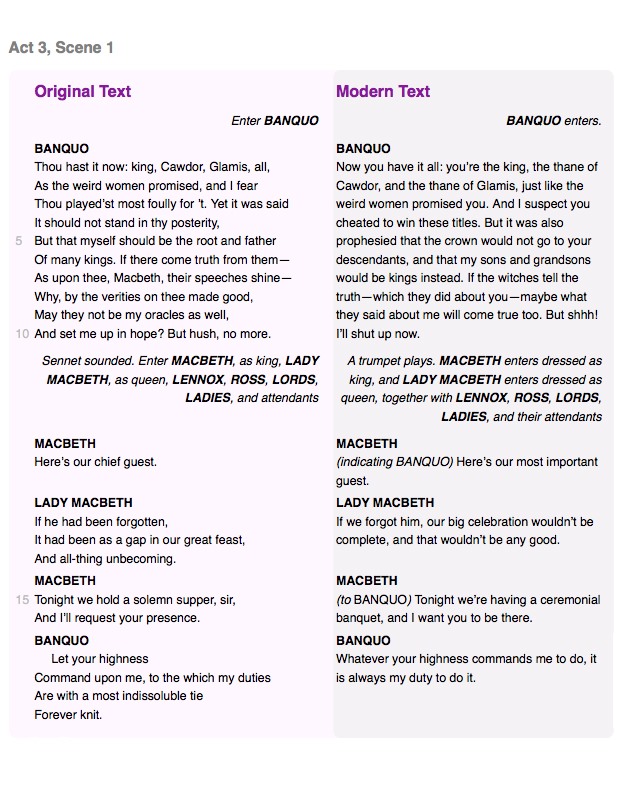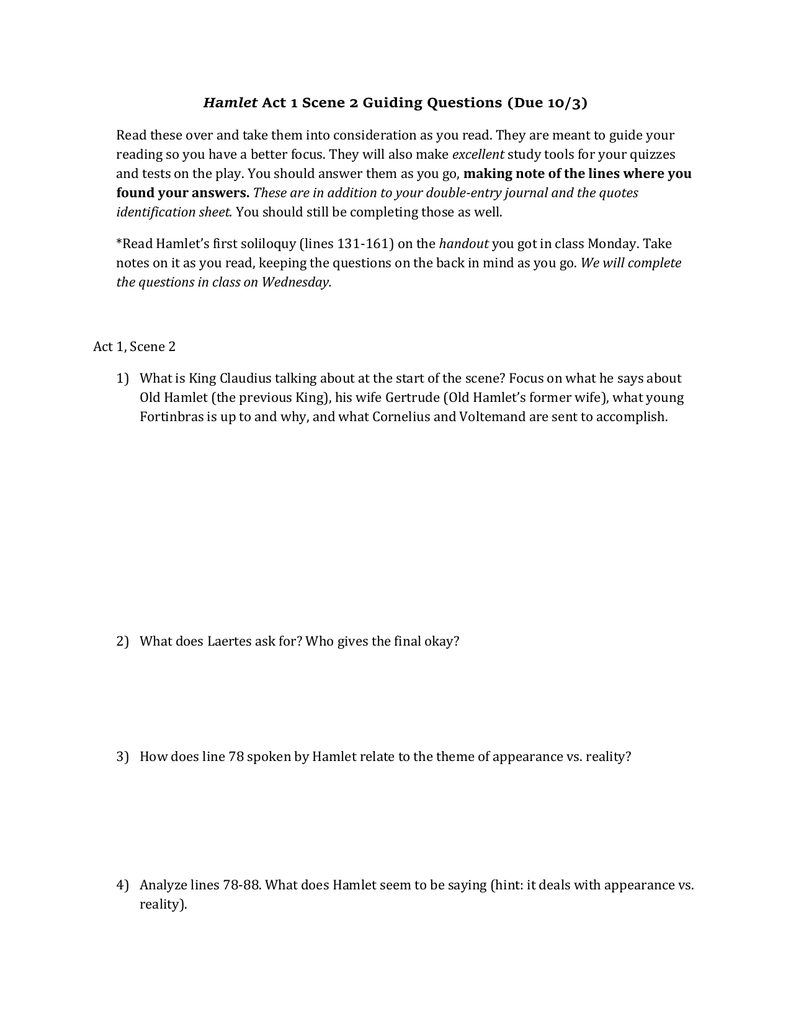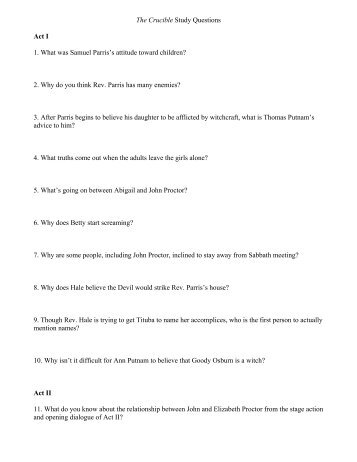Hamlet Study Guide Questions Act 4
Hamlet Study Guide This lesson provides a study guide divided into sections to help your students focus on particular areas. Do they need help remembering all the characters? There's a section for that. Maybe they're stuck on the major plot points. There are study questions on plot broken down for each act of the play. And if they understand both of those, they can skip to the section on the play's themes where they will be given questions that will help them hone their thinking about the big ideas in Hamlet. Questions about Characters.
Which characters see the ghost in Act I?. Who is Hamlet's closest friend?. What is Polonius's role at court?. Who are Polonius's children?. The King and Queen bring in a couple of Hamlet's old friends to figure out why he's acting so strangely. What are their names?. Who was Yorick?.
Which character dies by drowning?. Who is the Prince of Norway?. Who is the Prince of Denmark?. Who was the former King of Denmark?. Who kills Laertes?.

Who kills Claudius?. Who killed the former King of Denmark?. Which group of characters comes to Elsinore Castle to entertain the King and Queen?. Who kills Polonius? Questions about Plot Act I. As the play begins, why are the guards in a state of high alert?.
What supernatural event takes place in this first Act?. Ophelia receives advice about Hamlet from her family. What advice does her brother give? What advice comes from her father?. What secret does Hamlet learn from the Ghost?. What plan does Hamlet make by the end of the Act? Act II.
What is strange about Hamlet's behavior?. What does Polonius believe is the cause of Hamlet's strange behavior?. How does Hamlet plan to uncover the truth about Claudius? Act III. How does Polonius use Ophelia against Hamlet?.
Hamlet Study Guide Questions Act 4
How does Claudius react to the play?. What happens when Hamlet confronts his mother after the play?. How does Claudius deal with the threat that Hamlet presents to his throne?. In his soliloquy, what does Claudius admit to?. What promise does Gertrude make to her son?
Act IV. How does the death of her father affect Ophelia?. What does Claudius resolve to do about Hamlet?. How does the King try to determine the location of Polonius's body?. What events push Laertes to desire revenge? Act V. How did Hamlet return to Denmark?.
What happened to Rosencrantz and Guildenstern?. What is the treacherous plan concocted by Claudius and Laertes?. How does Claudius's plan backfire?. Who arrives at Elsinore Castle just before the end of the play?. What promise does Horatio make? Thematic Questions Revenge One of the major motifs in this play is revenge. Name all the characters who desire revenge.
What is the end result of this desire? Hamlet both seeks revenge and is the target of revenge. How does this duality affect the way he's seen by the audience? What is the overall lesson the play offers on the subject of revenge? Corruption Marcellus says, 'Something is rotten in the state of Denmark.' This is one of many quotes that tie in with the motif of corruption.
Hamlet Act 4 Study Guide Questions
The play has examples of corrupted marriages, corrupted relationships, corrupted governments, and more. Give several examples of corruption in the play. Trumpf laser programming manual. What are some of the themes brought out by this motif of corruption?
Acting Many of the characters in Hamlet either act or discuss acting. The players come to Elsinore and perform a play within the play. Hamlet puts on an act and pretends to be unhinged. Ophelia is directed by her father on how to act around Hamlet. What are some other examples of acting in this play? What meanings are brought out for the audience by the emphasis on performance?
Free Will or Fate? Hamlet wrestles with whether he has free will or is the pawn of fate. Find at least three quotes from the play mentioning destiny.
How much control does Hamlet have over his life? What does Shakespeare imply about the existence of free will in this play? Madness Hamlet might fake his madness in Act II, what he calls his 'antic disposition,' but Ophelia's slip into madness comes across as genuine.
Find several speeches in the play that refer to madness. Why does Hamlet hope to gain by acting insane? What is the role of madness in this play? How does it change the overall effect of the play?
Shakespeare includes characters in who are obvious foils for Hamlet, including, most obviously, Horatio, Fortinbras, and Laertes. Compare and contrast Hamlet with each of these characters. How are they alike? How are they different? How does each respond to the crises with which he is faced? Horatio’s steadfastness and loyalty contrasts with Hamlet’s variability and excitability, though both share a love of learning, reason, and thought. Claudius’s willingness to disregard all moral law and act decisively to fulfill his appetites and lust for power contrasts powerfully with Hamlet’s concern for morality and indecisive inability to act.

Fortinbras’s willingness to go to great lengths to avenge his father’s death, even to the point of waging war, contrasts sharply with Hamlet’s inactivity, even though both of them are concerned with avenging their fathers. Laertes’ single-minded, furious desire to avenge Polonius stands in stark opposition to Hamlet’s inactivity with regard to his own father’s death. Finally, Hamlet, Laertes, and Fortinbras are all in a position to seek revenge for the murders of their fathers, and their situations are deeply intertwined. Hamlet’s father killed Fortinbras’s father, and Hamlet killed Laertes’ father, meaning that Hamlet occupies the same role for Laertes as Claudius does for Hamlet. Many critics take a deterministic view of Hamlet’s plot, arguing that the prince’s inability to act and tendency toward melancholy reflection is a “tragic flaw” that leads inevitably to his demise. Is this an accurate way of understanding the play? Why or why not?
Given Hamlet’s character and situation, would another outcome of the play have been possible? The idea of the “tragic flaw” is a problematic one in Hamlet.
It is true that Hamlet possesses definable characteristics that, by shaping his behavior, contribute to his tragic fate. But to argue that his tragedy is inevitable because he possesses these characteristics is difficult to prove. Given a scenario and a description of the characters involved, it is highly unlikely that anyone who had not read or seen Hamlet would be able to predict its ending based solely on the character of its hero. In fact, the play’s chaotic train of events suggests that human beings are forced to make choices whose consequences are unforeseeable as well as unavoidable. To argue that the play’s outcome is intended to appear inevitable seems incompatible with the thematic claims made by the play itself.
Throughout the play, Hamlet claims to be feigning madness, but his portrayal of a madman is so intense and so convincing that many readers believe that Hamlet actually slips into insanity at certain moments in the play. Do you think this is true, or is Hamlet merely play-acting insanity? What evidence can you cite for either claim? At any given moment during the play, the most accurate assessment of Hamlet’s state of mind probably lies somewhere between sanity and insanity. Hamlet certainly displays a high degree of mania and instability throughout much of the play, but his “madness” is perhaps too purposeful and pointed for us to conclude that he actually loses his mind. His language is erratic and wild, but beneath his mad-sounding words often lie acute observations that show the sane mind working bitterly beneath the surface.

Most likely, Hamlet’s decision to feign madness is a sane one, taken to confuse his enemies and hide his intentions. On the other hand, Hamlet finds himself in a unique and traumatic situation, one which calls into question the basic truths and ideals of his life. He can no longer believe in religion, which has failed his father and doomed him to life amid miserable experience. He can no longer trust society, which is full of hypocrisy and violence, nor love, which has been poisoned by his mother’s betrayal of his father’s memory. And, finally, he cannot turn to philosophy, which cannot explain ghosts or answer his moral questions and lead him to action.
With this much discord in his mind, and already under the extraordinary pressure of grief from his father’s death, his mother’s marriage, and the responsibility bequeathed to him by the ghost, Hamlet is understandably distraught. He may not be mad, but he likely is close to the edge of sanity during many of the most intense moments in the play, such as during the performance of the play-within-a-play (III.ii), his confrontation with Ophelia (III.i), and his long confrontation with his mother (III.iv).